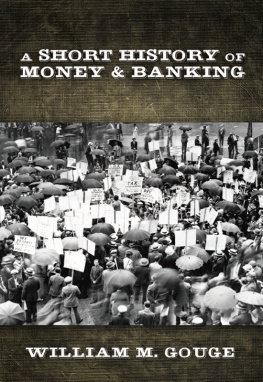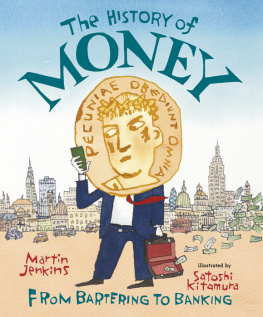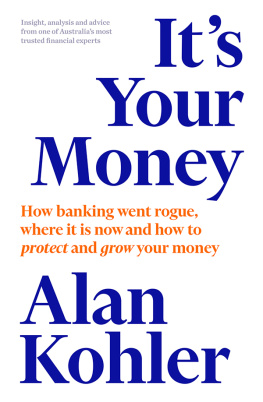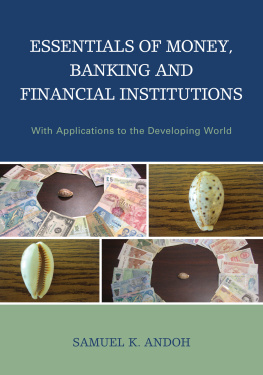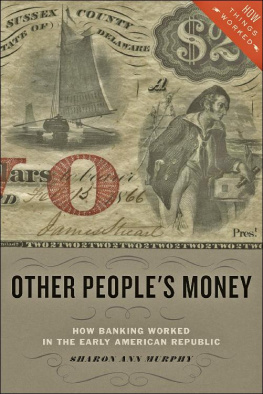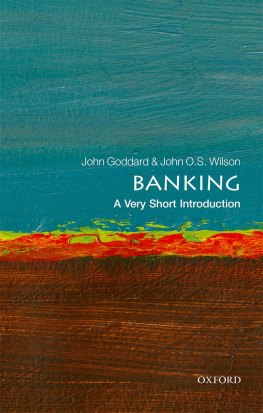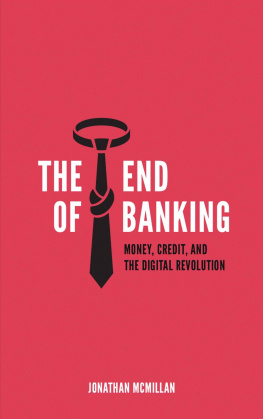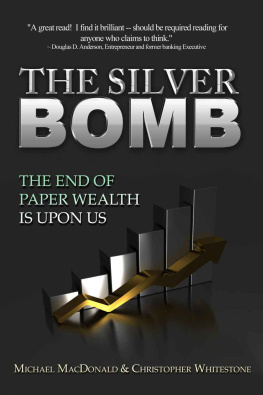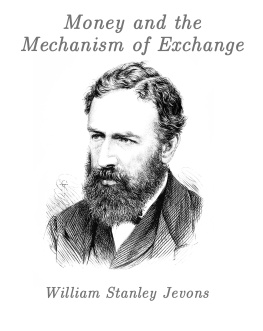William M. Gouge - A Short History of Paper Money and Banking
Here you can read online William M. Gouge - A Short History of Paper Money and Banking full text of the book (entire story) in english for free. Download pdf and epub, get meaning, cover and reviews about this ebook. year: 1968, publisher: Augustus M. Kelley Publishers, genre: Science. Description of the work, (preface) as well as reviews are available. Best literature library LitArk.com created for fans of good reading and offers a wide selection of genres:
Romance novel
Science fiction
Adventure
Detective
Science
History
Home and family
Prose
Art
Politics
Computer
Non-fiction
Religion
Business
Children
Humor
Choose a favorite category and find really read worthwhile books. Enjoy immersion in the world of imagination, feel the emotions of the characters or learn something new for yourself, make an fascinating discovery.
- Book:A Short History of Paper Money and Banking
- Author:
- Publisher:Augustus M. Kelley Publishers
- Genre:
- Year:1968
- Rating:3 / 5
- Favourites:Add to favourites
- Your mark:
- 60
- 1
- 2
- 3
- 4
- 5
A Short History of Paper Money and Banking: summary, description and annotation
We offer to read an annotation, description, summary or preface (depends on what the author of the book "A Short History of Paper Money and Banking" wrote himself). If you haven't found the necessary information about the book — write in the comments, we will try to find it.
A Short History of Paper Money and Banking — read online for free the complete book (whole text) full work
Below is the text of the book, divided by pages. System saving the place of the last page read, allows you to conveniently read the book "A Short History of Paper Money and Banking" online for free, without having to search again every time where you left off. Put a bookmark, and you can go to the page where you finished reading at any time.
Font size:
Interval:
Bookmark:


A SHORT HISTORY OF
PAPER MONEY & BANKING
Also Published In
Reprints of Economic Classics
By WILLIAM M. GOUGE
THE FISCAL HISTORY OF TEXAS [1852]
A
SHORT HISTORY
OF
PAPER MONEY AND BANKING
IN THE UNITED STATES
TO WHICH IS PREFIXED
AN INQUIRY
INTO THE
PRINCIPLES OF THE SYSTEM
BY
WILLIAM M. GOUGE
[1833]
With An Introductory Essay
William M. Gouge and the Formation of Orthodox American Monetary Policy
By JOSEPH DORFMAN

Reprints of Economic Classics
AUGUSTUS M. KELLEY PUBLISHERS
New York 1968

First Edition 1833
(Philadelphia: Printed by T. W. Ustick; and for Sale by Grigg & Elliott, No. 8 N. Fourth St., Uriah Hunt, No. 19 N. Third St., Hogan & Thompson, No. 139Market St., 1833)
Reprinted 1968 by
AUGUSTUS M. KELLEY PUBLISHERS
New York New York 10010
Library of Congress Catalogue Card Number 65-26366
ABP
Gift
Publisher
Copy
PRINTED IN THE UNITED STATES OF AMERICA
by SENTRY PRESS, NEW YORK, N. Y. 10019
William M. Gouge and the Formation of Orthodox American Monetary Policy
Few areas in American history have undergone such intensive study in recent years as the Jacksonian era. A major subject of controversy in that period is monetary and banking policy. It began with President Jacksons successful veto of the bill for rechartering the embryonic central bank, the Second Bank of the United States, in 1832. The subsequent struggle on both the federal and state levels rocked the nation intermittently for a decade. The ablest writer on the orthodox Jacksonian hard-money side was William M. Gouge (1796-1863); the bible of the movement was his A Short History of Paper Money and Banking in the United States,... to which is Prefixed an Inquiry into the Principles of the System (1833).
It seems to have been the first American economics treatise to win an international reputation. An abridged version was published in the influential Brussels journal, La Revue Universelle; in England the second part, the history part, was brought out by the leading political journalist, the radical William Cobbett. The foremost popularizer of the dominant British classical school, J. R. McCulloch, commended the treatise for its detailed history of American banking. The praise which it received at home as well as abroad was in good part due to Gouges careful research. For this he spent over two years at the library of the American Philosophical Society, Philadelphia, a rough counterpart of the famed British Museum. Gouge supplemented this by correspondence with knowledgeable persons in various states. Such was the level of the work that it is still a primary source for information on the history and organization of American banking, especially for the first third of the nineteenth century, a period when the veil of secrecy surrounding banking was even tighter than in other fields.
Gouge was an agile writer, shy in personal contact and adverse to speech making, but possessed of a persuasive pen, steeped at times in wit and satire. He was one of the most thorough students of our early banking [including the security and money markets] and also one of its keenest and most influential critics.
To furnish perspective on his monetary and banking views, it seems desirable to provide a short biographical sketch and a statement of his general economic philosophy. The son of an apothecary, he was born and raised in Philadelphia. Though he was to spend most of his mature life in Washington, he always preferred large cities, especially New York.
His career consisted largely of his activities as a financial journalist and as an employee of the United States Treasury; he pursued these occupations simultaneously for a good part of his life. He began as a journalist and first achieved prominence in Philadelphia while serving as co-publisher and editor (with Stephenson Smith) of the Philadelphia Gazette and City Advertiser from 1823 to 1831. He devoted the newspaper chiefly to monetary and banking reforms, advocating primarily what became a part of the Jacksonian creed, the prohibition of small bank notes, as a first step in the elimination of all bank notes. At the same time he helped prepare a so-called workingmens memorial to the Pennsylvania legislature which sought to prohibit the chartering or rechartering of banks with the corporate power of limited liability.
Ten years later, he again attempted the role of editor and publisher; he started the bi-weekly The Journal of Banking, but the result was the same. After a year he was forced by the loss of subscriptions to suspend publication, complaining of the publics antipathy to economic abstractions, especially the science of currency. He pointed to the fate of The Journal of Banking as further evidence that no journal of political economy or statistics, in either Europe or America ... has ever repaid expenses.
Gouges journalist activities were not limited to his own ventures; from the 1830s down to the Civil War he was a valued contributor to and adviser of such influential financial and economic journals as Hunts Merchants Magazine and The Bankers Magazine and Statistical Register, and such leading Democratic party organs as the Washington Globe and The United States Magazine and Democratic Review.
From about 1834 to March 1862, Gouge was with the Department of the Treasury except for relatively short periods when the Democrats did not occupy the presidency. Even when the Whigs and their successors were in power, he managed to retain his post for a part of the time.
Perhaps more important for our purposes was his involvement in policy making. He served as an economic adviser to secretaries of the treasury in Democratic administrations and such outstanding Jacksonian leaders in the monetary controversies as Senator Thomas Hart Benton of Missouri and Benjamin F. Butler, Attorney General in Jacksons second administration. Occasionally Gouge worked directly with President Martin Van Buren.
His general economic philosophy was in the Jefferson-Jackson laissez faire tradition. This view he showed more formally in his adherence to Adam Smith and the axioms of political economy of the British classical school typified by David Ricardo and its continental counterpart led by Jean-Baptiste Say.
Business corporations, especially banks, possessed of the privilege of limited liability and other perquisites, were incompatible with the equality of rights and unfavorable to the progress of national wealth. In the absence of the Argus eyes of private interest ... their affairs are much more carelessly and ... expensively conducted than those of individuals.
He questioned the desirability of laws fixing a maximum rate of interest; here he differed from his master, Adam Smith, and followed instead Jeremy Benthams Defence of Usury (1787). Similarly governments might issue bonds at a heavy discount but they must redeem them at their nominal price lest the affected states lose their credit.
The claims of the honest capitalist, Gouge insisted, were just as sacred as those of the honest laborer. His theory of wages was the traditional wages-fund doctrine: Every increase of capital increasing the fund out of which wages would be paid, would increase the reward of the laborer. Gouge chastised the lazy and improvident for neglecting to accumulate a capital and thus making themselves independent of others for means of both subsistence and employment.
Font size:
Interval:
Bookmark:
Similar books «A Short History of Paper Money and Banking»
Look at similar books to A Short History of Paper Money and Banking. We have selected literature similar in name and meaning in the hope of providing readers with more options to find new, interesting, not yet read works.
Discussion, reviews of the book A Short History of Paper Money and Banking and just readers' own opinions. Leave your comments, write what you think about the work, its meaning or the main characters. Specify what exactly you liked and what you didn't like, and why you think so.

